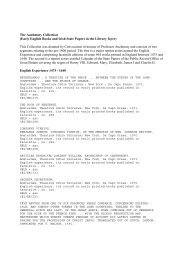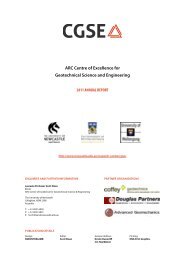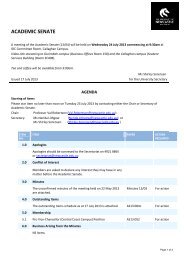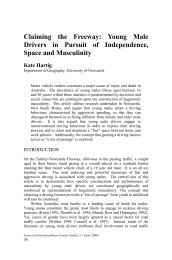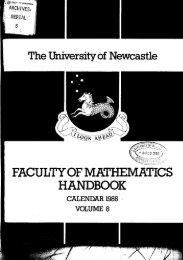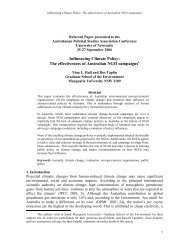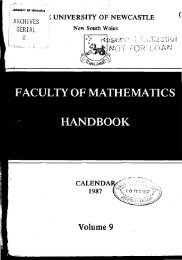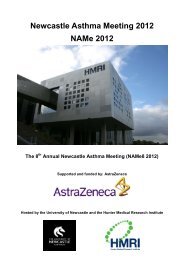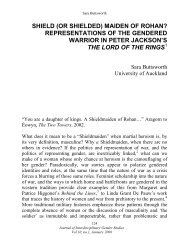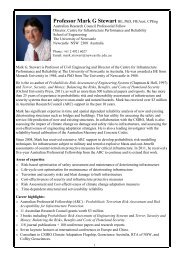n - University of Newcastle
n - University of Newcastle
n - University of Newcastle
Create successful ePaper yourself
Turn your PDF publications into a flip-book with our unique Google optimized e-Paper software.
8 AN AUSTRALIAN L~GVAOE. THE GBIJIJIIR.<br />
Some dialects say lie dl u, for which the usual form would<br />
be k e 11 u. But it is possible that the d here is radical, and so<br />
maintains its - place.<br />
In the Dieyerie tribe, near Cooper's Creek, South Australia,<br />
many words have in them the peculiar sound ncfr, as m un dru,<br />
' two,' ~~hich is also the Tamil word for 'three.' The Tamil is<br />
fond <strong>of</strong> this sound, and so is the language <strong>of</strong> Madagascar ; the<br />
Fijian prefixes the sound <strong>of</strong> 12 to d, so that dua is pronounced<br />
ndua. The sound <strong>of</strong> nclr comes by accretions from a single I-,<br />
and so the simpler forms <strong>of</strong> the Tamil mundru are muru,<br />
mudu.<br />
The dialect <strong>of</strong> King George's Sound, Western Australia, has<br />
this peculiarity, that it delights in closed syllables; for there tho<br />
t moc ga <strong>of</strong> the inland tribes is pronounced t w onli, and Ira t ta<br />
is kat.<br />
The consonants, then, may be thus arranged :-<br />
Gz~tizcrnls- k kh g gh g 11.<br />
Palatals- 6 ... j ... ... 9-<br />
Cerebrals- ? ... ... ... ... 1'.<br />
Bentals- t th d dh n 1.<br />
Labirrls- p ph b bh m ...<br />
Liyz~ids- ... ... ... ... n 1.<br />
-<br />
The vowels are jive in number. If we reckon the gutturalnasal<br />
g as a separate sound (~vhicll, cousidering its place in the<br />
language, we may justly do), but omit the nasalised I% as uncommon,<br />
and count 12 and I as dentals only, the simple consoiiant<br />
sou~lds are Jfteen in number. To these add the two<br />
sounds <strong>of</strong> tlz, and w and g as consonants; but omit the six<br />
aspirated consouants, for they are not simple sounds. The<br />
Auetralian alphabet thus consists <strong>of</strong> twenty-four simple elementary<br />
sounds.-ED.]<br />
THE PARTS OF SPEECI-I.<br />
The general meanin.?; <strong>of</strong> a noun is expressed by using its<br />
simple form; as, m a lr o :_o, ' a fish ' or ' fishes ' ; t i b b in, a ' bird '<br />
or ' birds,' in a general sense ; k i~ 1 a i, ' mood,' or 'a stick.' To<br />
make these plural, the plural pronoun rould be attached; as,<br />
u n n i m a k o r o, t a r a m a k o r o, ' this fish,' ' these fishes,'<br />
meaning that they are here present; to express ' the fish' as an<br />
active agent me must eny gali n1 ako r o, 'this fish,' sc., did some<br />
action. And so also with respect to all nouns, as wiil be expkzined<br />
under the head <strong>of</strong> pronouns.<br />
Kouns are the ' names <strong>of</strong> persons, things, actions, and places.'<br />
They are Proper, when ueed as the name <strong>of</strong> any individual person<br />
or thing ; Common and Collective, -hen denoting the nanles <strong>of</strong><br />
things singly or together; as, k fir i, 'man' or 'mankind'; && r a i,<br />
' kangaroo ' ; m2lx-o r o, ' fish?^ pronoun attached shows the<br />
number, whether singular or plural. Nouns mh~ch describe particular<br />
applications <strong>of</strong> the meaning <strong>of</strong> the verb are formed fro111<br />
the roots <strong>of</strong> their verbs ; s.y., m i, the root <strong>of</strong> the verb 'speali,' gives<br />
wiyellikh~~, 'one who spealrs,' 'a speaker'; wiyaiyb, 'one<br />
who always talks,' 'a talker,' 'chatte~er.' When names <strong>of</strong> things<br />
are appropriated to n person so as to be the person's name, that<br />
name must be declined in the first declensiol~ <strong>of</strong> nouns, to show<br />
it is the name <strong>of</strong> a person and not <strong>of</strong> the thing ; e.g., $jn t i g<br />
' a crab,' belougs to the tliird declension, and the gen~tive would<br />
be ti n ti g - w 4 , ' belonging to a crab'; but when it is i he<br />
name <strong>of</strong> a person, its gellitire would be t i n t i g - i1,mmbha, ' belosgia<br />
to Crab,'-Mr. or Mrs., according to the contest. There<br />
are a few terminntioris <strong>of</strong> gender in certain nouns, but nut<br />
generally; as, pori-bai, 'a husband'; porikun-bai, 'a wife';<br />
yinsl, 'a son'; yinhlkkn, 'a daughter'; but piriwal,<br />
means a 'king' or 'queen,' at:cording to the gender <strong>of</strong> the pronoun<br />
attached. To animals, in most instances, there are different



